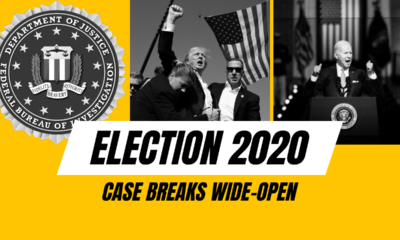Constitution
Compelled speech before SCOTUS
Does the Constitution ever mandate or even allow compelled speech? That question came to argument before the Supreme Court.
The second Big Case in the 2022 Term of the United States Supreme Court came to oral argument yesterday. This is a case of compelled speech, and specifically creative service that violates the religious conscience of the creator. From the questions the various Justices asked, one can almost predict the outcome.
Status of the Three Biggest Cases of 2022
CNAV reported on this list of the Three Biggest Cases of the 2022 Term last July. The three cases, in the order in which they have come (or will come) to argument, are:
- Students for Fair Admissions v. Pres. & Fellows of Harvard College (20-1199) and Students for Fair Admissions v. University of North Carolina et al. (21-707). The Court at first consolidated those cases, then deconsolidated them. The two cases do not present exactly the same questions. (Also, Justice Ketanji Brown Jackson had to recuse herself from the Harvard case but not the UNC case.)But they share one question in common: whether race can be a factor in college admissions. Accordingly the Court heard argument on both cases on the same day. The tone of the questions, and the numbers of Justices who took different tones, suggest an outcome favorable to SFA.
- 303 Creative LLC et al. v. Aubrey Elenis et al. (21-476). This is the case that came to argument yesterday. The question at issue in the Court’s grant of review reads:
Whether applying a public-accommodation law to compel an artist to speak or stay silent, contrary to the artist’s sincerely held religious beliefs, violates the Free Speech Clause of the First Amendment.
- Moore v. Harper (21-1271). This “redistricting case” asks whether a legislature can tell its State Supreme Court to go pound sand when it comes to drawing legislative and Congressional districts. The Court will hear argument Wednesday, December 7.
The compelled speech case
The second case – the compelled speech case – concerns us today. Reportage on the nearly two-and-a-half-hour argument session comes from The Hill, Patriot News Feed, and Todd Starnes’ blog. In addition, one can listen to an MP3 recording of the proceedings, or read their transcript.
The case is all too familiar to anyone with a religious conscience. Lorie Smith runs 303 Creative, which creates web sites. The problem is: she lives and runs her business in Colorado. Colorado, one of the “woke-est” States in the Union, has an Anti-discrimination Act. Under it, any creator must accept all comers and keep silent about her faith.
This is a pre-enforcement case, so no pair of same-sex roommates sharing bed is involved. All the arguments for this law come from government attorneys. They are Eric Olson, Solicitor General of Colorado, and Brian Fletcher, Deputy Solicitor General of the U.S. (as amicus curiae). Kristen Waggoner of Alliance Defending Freedom argued for Lorie and her business.
Justice Clarence Thomas must have known instantly one problem the petitioners might have: is a pre-enforcement case ever ripe? If two same-sex roommates had come to 303 Creative, gotten turned down, then reported the turn-down, that would be ripe. No one would question that. But this has not happened yet.
Ms. Waggoner reminded the Court that it has heard pre-enforcement cases before. Furthermore – and this is key – Colorado has a history of very aggressive enforcement of such “woke” laws. That alone chills the speech of 303 Creative.
Three Justices argue in favor of compelled speech
Justices Kagan, Sotomayor, and Jackson argued, through their questions, in favor of compelled speech. In one sense, Justice Kagan ought to have recused herself, because she is of that alternative lifestyle. Therefore her questions were self-serving. She led by trying to split the hairs between a dry announcement and more elaborate, typically gushing sentiment. Waggoner was having none of that. An announcement is speech, and the Colorado law compels her client to announce that which, according to Scripture, cannot exist.
Justices Sotomayor and Jackson also tried to split that hair, but Waggoner held firm. Sotomayor then addressed one question that illustrates a tremendous problem with current precedent. She asked whether someone could refuse to serve an interracial couple. Of course, nothing in Scripture forbids that, and the Court itself has an interracial couple – Clarence Thomas and his wife. Naturally Waggoner wasn’t going to assert a right to refuse service to such a couple. So Sotomayor tried – as have many before her – to equate sexual orientation with race.
Justice Neil Gorsuch brought the questioning back to the law, and asked about laws in States other than Colorado. Waggoner cited friend-of-the-court briefs from twenty States supporting her client.
Justice Amy Coney Barrett elicited a statement that 303 Creative’s objections to compelled speech do not limit themselves to same-sex roommates. 303 Creative would not necessarily build a wedding site for a man-woman couple if their ideas of what a marriage is, also contradicted Scripture.
The government lawyers come in for a grilling
Mr. Olson opened his argument by equating religious beliefs with racism, sexism and other forms of bigotry. Immediately Justice Thomas jumped on that. What, he asked, is the history of laws applying public accommodation doctrine to speech or creative expression? Olson tried to say it makes no difference to current precedent. Chief Justice John Roberts cited a case saying that foster care or adoption was not the same as, say, hotel accommodations or travel tickets. Then Roberts took apart another precedent on which Olson relied. This was Rumsfeld v. FAIR, involving providing a room in a law school for a military recruiter. (Presumably the recruiter was looking to sign students up to be military judge advocates. The FAIR in this case is Fairness and Accuracy In Reporting. ) “Empty rooms don’t speak,” Roberts said. To that, Olson answered that compelled speech was still a legitimate power, period.
Justice Samuel A. Alito forced Olson to admit that 303 Creative does not outright refuse to serve a pair of same-sex roommates – in any context other than a wedding. Alito also tripped Olson up on the equation of religious beliefs on marriage with bigotry.
Q. In light of what Justice Kennedy wrote in Obergefell [v. Hodges] about honorable people who object to same-sex marriage, do you think it’s fair to equate opposition to same-sex marriage with opposition to interracial marriage?
A. Yes.
And that’s the rub.
Neil Gorsuch makes a few scores
Justice Gorsuch probably gave Mr. Olson the hardest time. First he asked whether the stipulations Olson made, vitiated the entire case against 303 Creative. Those stipulations addressed how far could compelled speech go. For instance, can the law compel a free-lance speechwriter to write a speech for someone with whose ideology he disagreed? Incredibly, Mr. Olson said yes. How does that square with protecting freedom of religious expression?
It doesn’t, and Justice Gorsuch knew it. Consider this exchange:
A salient example of compelled speech
A. The company here says in no uncertain terms will they ever sell a product or a service to a same-sex couple permitting that I…
Q. No, what they say is we will not sell to anyone – anyone – a message that I disagree with as a matter of religious faith, just as a speech writer says or the press release writer, the freelance writer, says I will not sell to anyone a speech that offends my religious beliefs.
A. But, here, they are defining their service by excluding someone based on their…
Q, That’s their religious belief.
A. Well, in Colorado…
Q. You can’t change their religious belief, right? And you protect religious beliefs under the statute, right? That is one of the protected characteristics in theory.
A. Yes, and in practice. If it wasn’t in practice, we have heard about it over – over the past several years and – and my friend has pointed to no example where this has been applied in a…
Q. Mr. [Jack] Phillips [of Masterpiece Cakeshop] did go through a re-education training program pursuant to Colorado law, did he not, Mr. Olson?
A. He – he went through a – a process that ensured he was familiar with…
Q. It was a re-education program, right?
A. It was not a re-education program.
Q. What do you call it?
A. It was a process to make sure he was familiar with Colorado law.
Q. Someone might be excused for calling that a re-education program.
Indeed.
Kavanaugh and Barrett get in their licks
Justice Brett Kavanaugh also tripped up Olson on precedents, and interesting distinctions. Kavanaugh brought out that if a publishing house has First Amendment protection, why not a website designer?
Justice Barrett asked whether a newspaper could decide, during a certain month, to run marriage announcements for same-sex roommates only. Mr. Olson fell neatly into her trap, by saying, Yes.
Justice Jackson tried to rescue Olson on a narrow question of whether an expression belongs to the web designer or the designer’s client. Or at least, that’s how the transcript appears. From CNAV’s read of it, Mr. Olson did not take the lifeline Jackson offered, such as it was.
Fletcher falls into compelled speech traps of his own
Fletcher began with the Rumsfeld case, saying that:
Compulsion of speech is permissible because it’s incidental to a content-neutral regulation of conduct.
Roberts at once disagreed, challenging Fletcher to cite one case in which the Court compelled speech contrary to one’s beliefs. Fletcher tried to make Rumsfeld that case, but clearly Roberts was having none of that. Neither was Justice Barrett, who pointed out that all the law schools had to do was provide a room and maybe announce time and place for recruitment. Barrett asked whether Fletcher would apply Rumsfeld to require the school’s Career Development Office (CDO) to provide detailed statements about what a judge advocate is, and career tracks in the Judge Advocate General’s (JAG) Corps. What is the JAG Corps, after all, but the biggest law firm in the country? Fletcher seemed to entrap himself as neatly as Olson did. He did not suggest that the school’s CDO would have to make such an accommodation. Why, then, must 303 Creative?
Kagan and Sotomayor tried to rescue him by asking whether 303 Creative’s “standard wedding website” included a line about celebration of marriage. Fletcher could not remember whether it did or not. This led Roberts to point out that everyone who visits 303 Creative’s company website knows where that business stands. Fletcher then wound up saying the law could compel the company to do something contrary to how they represent themselves.
Barrett and Kavanaugh trap him further
For Fletcher, the session went from awful to good grief. Justice Barrett asked whether a web design firm with alternative-lifestyle ownership would have to design a site for a Christian club. Fletcher said no, because that’s not discrimination based on status. But why, asked Barrett, can’t we observe that both this hypothetical company and 303 Creative discriminate on message? Fletcher insisted on making a distinction without a difference. Justice Alito bore down on this, asking what “public accommodation” means, and how far a State could take the concept.
Justice Kavanaugh laid the neatest trap of all. He asked Fletcher to distinguish, if he could, a wedding announcement from a free-lance speech.
Q. You don’t think applying a public accommodations law to a speech writing business that offers to do speeches or PR releases for anyone, but they say, oh, we’re not going to do this message – you don’t think that’s this – they would say that’s this case, and you say it’s not because?
A. I think they’d be wrong…. Speech writers aren’t likely to be public accommodations. Set that aside.
Q. Until they are, after this case if you prevail, I mean, that’s what States could do.
Bingo. And not even Justice Jackson could help Fletcher after that gaffe.
Ms. Waggoner’s rebuttal
Kristen Waggoner then had time to rebut the arguments of Messrs. Olson and Fletcher. She began thus:
The United States says that you can refuse to express messages unless those messages are about marriage and unless those views on marriage have to do with believing that marriage is between a man and a woman. That’s a significant concession that the government has made.
She addressed all the hair-splitting and distinctions without differences Olson and Fletcher made. Then she said Colorado’s Act defines public accommodations so broadly that one would lose First Amendment protections merely by opening a business. After denying that the Court has ever allowed compelled speech, she concluded:
In the end, it is not Ms. Smith who is asking you to change the law, but Colorado. This Court should affirm, again, that public accommodation laws cannot be used to compel speech, and this includes artistic expression, photography, painting, calligraphy, and films, forms of media that the lower courts have shockingly refused to recognize as speech when it comes to marriage. And, yes, this Court should give guidance to limit the cruelty that has been imposed by endless litigation on artists like Jack Phillips.
One need not agree with a particular belief to affirm that law-abiding people have a right to speak their conscience, including on a controversial subject like marriage.
To support that, she appealed to the Golden Rule and to the basic principle of self-government.
Analysis
Either Olson and Fletcher are not particularly bright, or else Mr. Justice Thomas has been holding seminars with his fellow conservatives on the fine art of logical and rhetorical entrapment. Or else – as seems most likely – Olson and Fletcher got stuck with the scut detail of defending the indefensible. Incredibly, neither man seems to understand why his position is indefensible.
Justices Jackson, Kagan and Sotomayor got off much sarcasm at the expense of Ms. Waggoner and her client. But in the end they could not shake the petitioner’s position. Nor could they help the respondent or the “friend of the court” out of the logical traps into which they had fallen. If anything, Olson and Fletcher dug themselves in deeper. Did no one ever tell them that when you’re in a hole, stop digging?
Olson and Fletcher’s twists of logic shook even the Chief Justice’ usual studied neutrality. So – barring a reversal of outlook on the part of the Justices that strains credulity even to imagine – one can indeed predict the outcome.
On the basis of the questioning, and the reactions to the answers, CNAV predicts a result of 5-3-1. In short, CNAV predicts the same vote as obtained in Dobbs v. Jackson Women’s. The particular Justices will likely fall out the same way as in Dobbs.
Lorie Smith sought a pre-emptive strike against Colorado’s compelled speech law. She seems to have scored a direct hit. If Alito or Thomas writes for the Court, the damage will prove irreversible.
Terry A. Hurlbut has been a student of politics, philosophy, and science for more than 35 years. He is a graduate of Yale College and has served as a physician-level laboratory administrator in a 250-bed community hospital. He also is a serious student of the Bible, is conversant in its two primary original languages, and has followed the creation-science movement closely since 1993.
-

 Guest Columns5 days ago
Guest Columns5 days agoData Centers Are a Repeat of History in PA’s Coal Region
-

 Executive4 days ago
Executive4 days agoWaste of the Day: Secret Settlements get Taxpayer Money
-

 Executive5 days ago
Executive5 days agoWaste of the Day: Throwback Thursday – Americans Lead Moroccan Pottery Classes
-

 Civilization5 days ago
Civilization5 days agoThe Northwest Passage Will Be Decided by Capability, Not Law
-

 Accountability24 hours ago
Accountability24 hours agoWaste of the Day: Principal Bought Lobster with School Funds
-

 Constitution14 hours ago
Constitution14 hours agoTrump, Canada, and the Constitutional Problem Beneath the Bridge
-

 Civilization3 days ago
Civilization3 days agoThe devil is in the details
-

 Executive3 days ago
Executive3 days agoTwo New Books Bash Covid Failures













No one can be obligated to support deviant behaviors or promote deviant behaviors. ‘Same-Sex” relationships, i.e. sodomy, is abnormal unnatural behavior only humans engage in. Forcing someone to support or sanction it is unconstitutional. It is no different than forcing someone to support pedophilia or prostitution. All of which are BEHAVIORS a person chooses to engage in. Many people want to force others to have to support their behaviors and attitudes, and don’t like it when people won’t support their behaviors and attitudes.
And remember, many dominance behaviors animals engage in to determine which males and females can reproduce are claimed to be examples of sodomy.